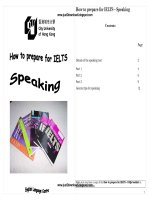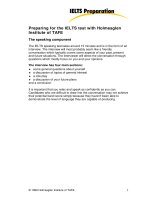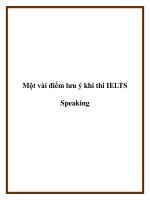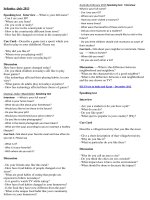Ielts speaking fluency guide final
Bạn đang xem bản rút gọn của tài liệu. Xem và tải ngay bản đầy đủ của tài liệu tại đây (4.17 MB, 28 trang )
THE FLUENCY GUIDE
HOW TO BECOME
fluent
IN ENGLISH
KEITH O'HARE
About the Author
Keith runs The Keith Speaking Academy.
He has been working in international
education for over 20 years as a teacher,
teacher trainer and education manager.
He has helped over 20,000 students
prepare for their IELTS Speaking test with
his online courses.
COPYRIGHT © 2022, KEITH SPEAKING ACADEMY
table of
contents
2 What affects your fluency in IELTS Speaking?
4 How vocabulary affects fluency
7 How to activate vocabulary to improve fluency
9 How grammar affects fluency in IELTS Speaking
11 How to automate grammar to improve fluency
13 Focus on chunks, not words
16 How to practice chunks
18 How pronunciation affects fluency
20 Why nerves affect fluency
22 Thinking of ideas affects fluency
24 Solutions to be more fluent in English
COPYRIGHT © 2022, KEITH SPEAKING ACADEMY
2
COPYRIGHT © 2022, KEITH SPEAKING ACADEMY
Some people think the 4 skills of IELTS Speaking (Fluency, Vocabulary,
Grammar and Pronunciation) are separate.
In fact, the IELTS Band Descriptors for speaking might encourage you
to think like this, because they show you how each skill is evaluated
separately.
However, these skill are not separate!
Actually, they are all closely inter-connected.
So, fluency is actually affected by your vocabulary, grammar and
pronunciation, as well as several other factors.
This means when you want to work on your fluency, you need to work on
all 4 skills together in a holistic way.
Let’s find out more about this and how to work on developing them all.
3
COPYRIGHT © 2022, KEITH SPEAKING ACADEMY
4
COPYRIGHT © 2022, KEITH SPEAKING ACADEMY
Well, let’s think about it first of all, as you’re speaking, finding the right
word is going to affect your fluency.
If your vocabulary is not big enough, or you’re trying to use difficult
words you don’t fully know, or if you confuse words from word families
(e.g. economy, economic economist), this will create hesitation and
affect fluency.
How do you solve that?
Well, the first thing is to start activating your vocabulary.
It’s all well and good reading vocabulary but if you’re not speaking it
out and activating it, it’s not going to come fluently.
We have two kinds of vocabulary, passive and active.
Passive vocabulary are the words you recognise and you can read.
And if you hear them, you know them, but you may not be able to use
them.
Active vocabulary are the words that have gone from passive to
active, and you can actually start using them correctly.
5
COPYRIGHT © 2022, KEITH SPEAKING ACADEMY
So getting as much vocabulary as you can into your active ‘pool’ is really
important, so you can start using it.
That builds up your fluency.
A key tip is, if you don’t feel comfortable or you’re not sure how to use
a word, don’t use it in the test.
Why? Because if you get it wrong, your vocabulary score comes down
and also your fluency will come down because you can’t use it properly
or fluently.
6
COPYRIGHT © 2022, KEITH SPEAKING ACADEMY
7
COPYRIGHT © 2022, KEITH SPEAKING ACADEMY
So, the way to activate your vocabulary is to repeat words and phrases
in context.
What’s more, practice using them in different contexts.
There is research that shows you need to see the word in for at least
four different contexts to recognise it, and to be using it in at least
three or four different contexts before it becomes active.
So practice repeating the words in different conversations, different
answers, and different contexts.
Make sure you’re not memorising your answers, which means you are
only using words in one context. That is not good. Be flexible. Use new
words in different contexts.
Discover how to effectively
activate your vocabulary with
the Speaking Success System
Speaking Success System
8
COPYRIGHT © 2022, KEITH SPEAKING ACADEMY
9
COPYRIGHT © 2022, KEITH SPEAKING ACADEMY
When you’re speaking and you’re thinking about the correct grammar,
that also affects how fluent in English you are.
So what you want is to try, as much as possible, to automate your
grammar (i.e. make it automatic, so you don’t have to think so much
about it)
If you can automate your grammar, even a little, then you’re going to be
speaking more fluently.
Think about famous basketball players. What do they do?
They bounce the ball and they shoot, then they bounce the ball and they
shoot again, and they spend hours shooting.
They practice repeating and repeating, until they automate the move,
because when they’re playing on the court, they haven’t got time to
think. They need to be automatically dribbling, passing and shooting.
So they need to automate as much of that as
possible.
Well, guess what? It’s the same with speaking
English.
If you can automate some of the grammar, you
can just use it much more fluently and then
focus more on ideas and fluency when you’re
speaking.
COPYRIGHT © 2022, KEITH SPEAKING ACADEMY
10
11
COPYRIGHT © 2022, KEITH SPEAKING ACADEMY
So how can you start to automate your grammar?
Well, similar to the basketball player, you need intense repetition.
In fact, I have something called the Fluency Gym, which is about intense
repetition.
In the Fluency Gym, you’re taking some grammatical structures and
repeating them again and again, until you start to automate them and
become much more confident with them.
Check out the Fluency Gym here.
12
COPYRIGHT © 2022, KEITH SPEAKING ACADEMY
13
COPYRIGHT © 2022, KEITH SPEAKING ACADEMY
Another thing connected to both vocabulary and grammar, is that a lot
of students focus on individual words. So they are putting the words
together more slowly and with more hesitation.
I think you need to change that focus from words to phrases (or
chunks).
In a recent interview with the polyglot, Steve Kaufmann, we talked
about phrasing, which is the idea of thinking about phrases of language,
(e.g. three or four words together) rather than individual words.
It is such an important part of being fluent in English.
For example, here’s a chunk of language,
to be honest
Now, if I’m thinking about words – ‘to‘ + ‘be‘ + the adjective ‘honest‘,
I’m thinking of three words!
However, if I think of a chunk or a phrase, instead of words – I only have
to focus on one sound,
If I can automate phrases like this, then that’s going to help my fluency.
Focusing on chunks and phrasing is much more important than
individual words.
14
COPYRIGHT © 2022, KEITH SPEAKING ACADEMY
Notice that many spoken fillers or connectors are actually chunks, and
we can learn them as sounds, instead of words.
For example,
on top of that
for starters
to kick off
first of all
without any doubt
by and large
in a nutshell
15
COPYRIGHT © 2022, KEITH SPEAKING ACADEMY
16
COPYRIGHT © 2022, KEITH SPEAKING ACADEMY
Having practiced a chunk, we then need to build flexibility by practicing
similar chunks. This will also help us hardwire the grammatical or lexical
structure. We can do this with simple substitution drills.
Let’s take an example with this structure,
I enjoy going out
Now let’s practice substitution. We will change the last word
I enjoy going out.
I enjoy cooking.
I enjoy painting
Make sure you say the whole phrase as one sound. The mistake most
people do is that they say the stem, “I enjoy”, then think of the word they
are going to change, pause, and then add the extra word. So it is no
longer a chunk. The results is
I enjoy (pause) cooking
That’s not helping because they’re thinking and they’re causing the
hesitation.
So when you’re practicing like this, think first, speak second.
Make sure you say the whole phrase/chunk fluently, without hesitation.
This is the intense practice of the basketball player, to give. Think first,
speak second.
COPYRIGHT © 2022, KEITH SPEAKING ACADEMY
17
18
COPYRIGHT © 2022, KEITH SPEAKING ACADEMY
We have talked about grammar, vocabulary and chunks. Let’s look now
at pronunciation.
If you can’t pronounce sounds and words correctly, or it’s difficult for
you, that will affect your fluency.
Likewise good word stress, sentence stress, and intonation are all critical
for becoming more fluent in English.
One of the key things between getting a band 6 and a band 7 or 8 is the
long turn.
That is being able to speak a long sentence (or several sentences),
maintaining or sustaining, correct intonation.
So getting that natural spoken English intonation over longer sentences
is critical is you want a band 7 or above.
So how do you work on intonation?
It’s not easy at all, and there are no hard and fixed rules about it.
However, you can find lots of practice in the Fluency Gym videos.
19
COPYRIGHT © 2022, KEITH SPEAKING ACADEMY
20
COPYRIGHT © 2022, KEITH SPEAKING ACADEMY
Another thing that influences your fluency of course, is nerves.
If you’re nervous, that can ruin your fluency. Many candidates ruin their
test by letting nerves take control. They can’t breathe, can’t think,
hesitate and lose control.
There are several things you can try to control your nerves, including
controlling your breath, accepting nerves, using posture, the 3-3-3
approach and so on.
I have done a video about handling nerves in the test that you can check
out here.
21
COPYRIGHT © 2022, KEITH SPEAKING ACADEMY
22
COPYRIGHT © 2022, KEITH SPEAKING ACADEMY
The other thing that can seriously affect your fluency is thinking of
ideas. Especially when have to do that so quickly.
So it’s not just getting the words, but also getting the idea, getting it
quickly enough, processing it and bringing it out through your mouth.
I think the best way to improve that, is to do lots of research on the
common IELTS Speaking topics before the test. Read and listen as widely
as you can.
There are plenty of resources for that here.
23
COPYRIGHT © 2022, KEITH SPEAKING ACADEMY








